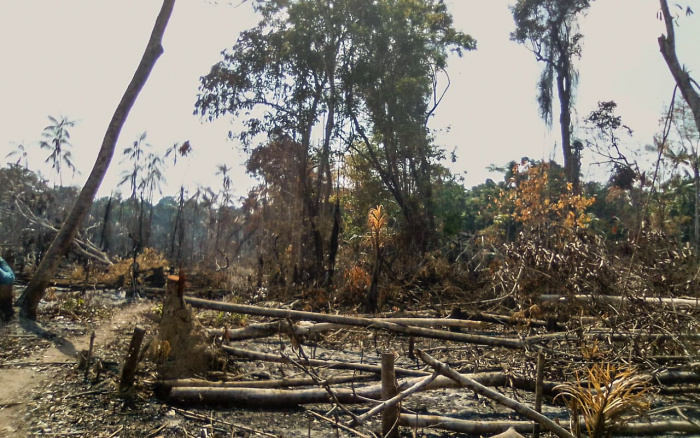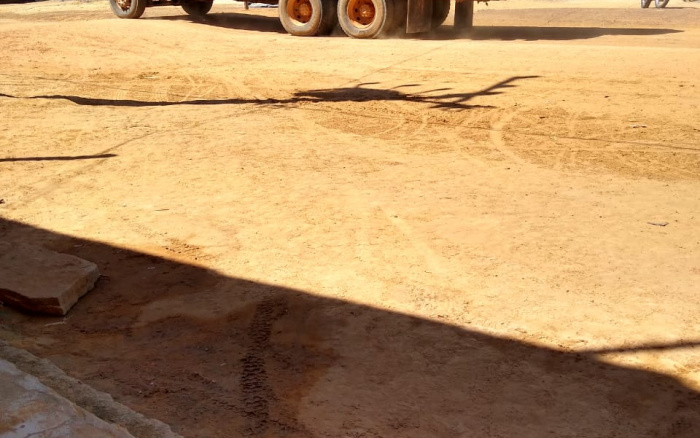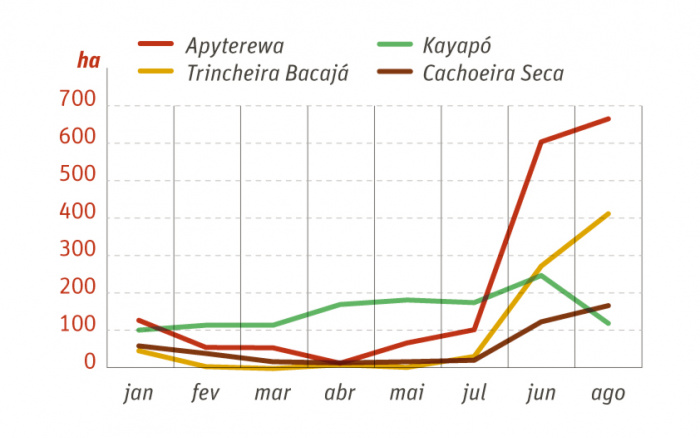Você está na versão anterior do website do ISA
Atenção
Essa é a versão antiga do site do ISA que ficou no ar até março de 2022. As informações institucionais aqui contidas podem estar desatualizadas. Acesse https://www.socioambiental.org para a versão atual.
Stolen forest: invasions threaten Indigenous Lands in the Xingu basin
quinta-feira, 08 de Outubro de 2020 
Guarantee of Law and Order Decree
Against disintrusion
Stolen forest
Covid-19: Double threat
Land grabbing in Conservation Units
Fire in the Xingu basin
Esta notícia está associada ao Programa:
Despite the Army's presence in the region, illegal activities in Protected Areas exploded. With the cancellation of Ibama's operations, deforestation at the Apyterewa and Trincheira Bacajá ILs increased 878% and 12,980% between May and August, respectively
“At midnight, almost every weekend, a truck comes. I saw this truck that passed with wood inside our land. There is no kuben area there ”, says Mokrãn Xikrin, referring to the invasions and theft of wood, especially chestnut trees, in the Trincheira Bacajá Indigenous Land (IL), in Pará state. From the Kenkro village, the Xikrin can already hear the noise of chainsaws, from tractors advancing over their territory and see the smoke from deforestation in areas close to the villages.
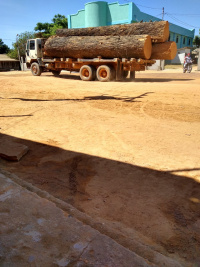
In the neighboring Indigenous Land, Apyterewa IL, the reports are similar: “more and more people are invading the forest. There is mining, there is much more illegal mining, ”says Xakarovara Parakanã, who also warns that invaders are getting near the villages.
The advance of deforestation, land grabbing and illegal mining has placed the Apyterewa and Trincheira Bacajá ILs at the top of the ranking of the most deforested in the Amazon in 2019, a feat that can be surpassed this year, since they already total 1,625 and 780 hectares cleared between January and August, respectively.
In both Indigenous Lands, one fact draws attention: deforestation exploded after the cancellation, not yet justified, of field operations of the Brazilian Institute for the Environment and Renewable Natural Resources (Ibama), which had been successfully combating deforestation within these ILs until May this year.
From 3 hectares deforested in May in Trincheira Bacajá, deforestation jumped to 411 hectares in August, an increase of 12,980%. In Apyterewa, deforestation increased by 393% in the month following the suspension of operations, and continued to grow: between July and August, 1,200 hectares were deforested, almost three times more than the total deforested between January and June. The data are from Sirad X, the monitoring system of the Xingu+ Network.
Guarantee of Law and Order Decree
In May, the government suspended Ibama and authorized the use of the Armed Forces in the fight against illegal deforestation and fires in the Legal Amazon, through the Guarantee of Law and Order Decree. The so-called “Verde Brasil 2” operation was launched on May 11.
“Even with the presence of the Army, deforestation rates rose again after a period of relative low, as a result of Ibama's work”, comments John Razen, ISA's lawyer. He recalls that in March and April 2020, Apyterewa and Trincheira Bacajá ILs had a reduction of 40% and 49%, respectively, compared to the same period in 2019. “The question that remains is: how effective are these actions in the territories?"
In a note, the staff of the 23rd Jungle Infantry Brigade, responsible for Apyterewa and Trincheira Bacajá ILs, said that since the beginning of Operation “Verde Brasil 2”, on May 11, continuous actions have been carried out in the areas. According to the text, fuel, chainsaws, conveyor belts for the separation of minerals, energy generators, tractors and an excavator were seized, among other materials that “were proven to be used for the practice of environmental crimes”. Despite this, between May and August, deforestation associated with illegal invasions did not stop increasing both in Apyterewa and Trincheira Bacajá.
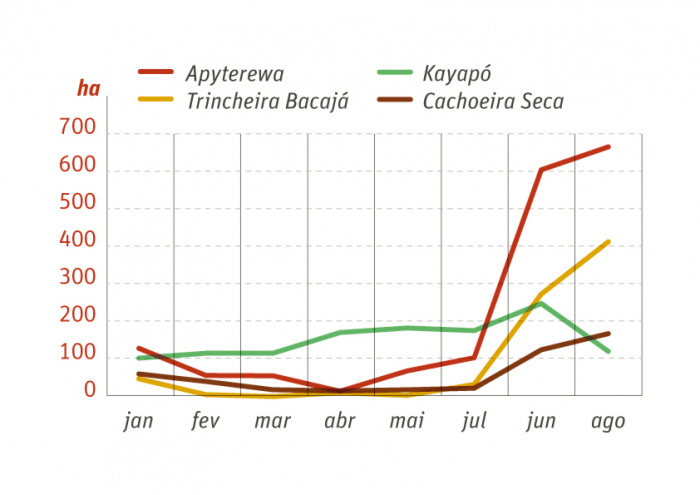
Along with the Apyterewa and Trincheira Bacajá ILs, two other areas contributed to the increase in deforestation among Indigenous Lands in the Xingu basin: the Cachoeira Seca and Kayapó ILs. Between July and August alone, more than 3 thousand hectares were deforested in the basin's ILs, an increase of 296% over the previous two months.
Against disintrusion
Approximately 20% of the Apyterewa Indigenous Land is under the full possession of the indigenous people, according to an estimate by Funai. The region, home to the Parakanã people, is under strong pressure from invaders, deforestation and, more recently, illegal mining. Last year, Apyterewa reached the second place in the ranking of the most deforested ILs in the Amazon.
Located in the Belo Monte Hydroelectric area of influence, a territorial protection plan, which includes the removal of illegal occupants, should have been implemented in 2011, before the installation of the plant.
Instead of the removal of the non-indigenous occupants, a land grabbing process is underway in the region. Folha de S. Paulo's report revealed a scheme whereby new invaders are installed inside the IL in lots sold, auctioned or even donated irregularly by criminal networks. The point of logistical support is Vila Renascer, a village that emerged in 2016 within the IL, exactly 11 years after the completion of its recognition process as an indigenous territory.
Images Planet/MapBiomas
“Without the forest, we cannot live. We have been fighting against deforestation, invasions and illegal mining in our land for a long time. This is hurting all of us, our culture, our history. Our elders are very concerned, how will our children and grandchildren know the history of the Parakanã people? How can we, without the forest, tell our story? ”, Says Xakarovara.
More recently, illegal mining has consolidated itself as an attraction factor for invaders. Although the first records of the activity are from 1974, since the demarcation of IL, in 2007, there were no more signs of mining. Last year, however, two active mines were detected. In all, 174 hectares deforested for illegal activity have already been detected.
“More and more they are invading the forest, there is much more illegal mining. We can become contaminated with the mercury they are using in the mining, which also concerns us, the Parakanã people”, he comments.
Stolen forest
The invasions are ever closer to the villages in the extreme southwest of the area, where it is possible to see branches of illegal roads to the Trincheira Bacajá IL. It is also in Apyterewa IL that an illegal road of approximately 40 kilometers was reactivated and expanded in 2019. This road crosses the Arawete Igarapé Ipixuna IL, giving access to the Trincheira Bacajá.
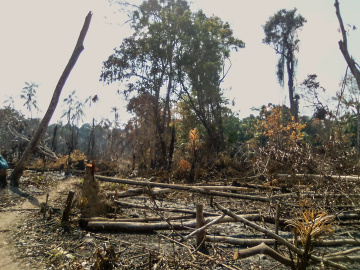
There, deforestation detected between July and August increased 7x compared to the first five months of the year. There are at least three active invasion fronts, increasingly closer to the villages. “This accelerated deforestation on this invasion front reveals the determination of the invaders to occupy and exploit the forest resources of the Trincheira Bacajá”, says the text of the complaint made by the Bebô Xikrin of the Bacajá Association (Abex).
The invasions in the Trincheira Bacajá IL are nothing new, but they got worse last year. In August 2019, the pressure on the territory and indigenous people reached their limit when, through audio messages, a group of 300 invaders threatened to “hunt” the indigenous people. [Know more]
“The invaders who don't respect anything are burning our forest. The animals of the forest are burning with it. How many tortoises have already been burned? How many tapirs have been burned? How many armadillos have already been burned? We need to make this stop. We need to remove the invasion of our land. It is ours and we know how to take care of it. It belongs to our children. We know how to respect it”,says Tedjere Xikrin, an old chief of the RapKô village, one of the epicenters of the invasions in 2019.“ They are stealing the forest, that is our knowledge. Why do they do it? Stop it! ”He continues.
"The expectation of regularization of illegal occupations is an important factor in attracting invaders, and it is sustained in the speeches of public authorities who have been in favor of the reduction of indigenous territories, as well as the ineffectiveness of actions to combat deforestation in progress", points out Razen.
The request for the removal of the invaders from the Trincheira Bacajá is one of the emergency measures requested in the Claim of Non-Compliance with Fundamental Precept (ADPF) submitted by Apib to the Supreme Federal Court (STF) in June. This type of legal action seeks to prevent or repair damage to some basic constitutional principle resulting from an act or omission by the State. Still, illegal activities in the area continue. [Know more]
Images Planet/MapBiomas
Covid-19: Double threat
The intensification of conflicts puts the integrity of the indigenous peoples at risk and increases the spread of the new coronavirus in the territory. There are already at least 9 deaths and 1,265 cases in the Kayapó IL, 82 at Cachoeira Seca IL and 307 cases and one death in the Trincheira Bacajá IL, that of Beptok Xikrin, chief Onça. No cases have yet been confirmed in the Apyterewa IL.
It is precisely in the southern region of Xikrin territory, where invasions are increasingly closer to villages, that shows the highest rate of contagion. “The first cases of the disease appeared in one of the villages close to the invasion region: three positive cases were reported at the end of April,” says the text of the letter from the Associação Bebô Xikrin do Bacajá (Abex). In August, the same village already had more than 50 cases, a rate that rose to 110 in September, according to Dsei Altamira.
Land grabbing in Conservation Units
Although the rate of deforestation in Conservation Units (CU) in Xingu has decreased by 17% compared to the previous two months, the numbers are staggering: 9,100 hectares were deforested in the period, equivalent to the size of the city of Niterói, in Rio de Janeiro (RJ).
Two of the most deforested CUs, the National Forest (Flona) of Altamira and the Nascentes do Cachimbo Biological Reserve (Rebio), are in the area of influence of Br-163. In the Rebio, a strict Protection Conservation Unit, deforestation has doubled compared to the previous two months, with 800 ha deforested in just two months. The large open areas reveal invasion and land grabbing processes in the region.
Further north, in the Riozinho do Anfrísio Extractive Reserve , 134 hectares were deforested in the period, 110% more than that detected in the previous two months. Illegal Logging, illegal mining and land grabbing concern riverside dwellers and their partners.
Images Planet/MapBiomas
Fire in the Xingu basin
In September, more than 78,000 hot spots from the VIIRS satellite were detected in the Xingu basin, an increase of 94% over the same month of 2019. In Pará, this increase was 163%, in Mato Grosso, 38%.
The data are from the 20th Sirad X newsletter, the deforestation monitoring system of the Xingu + Network, an articulation of indigenous people, riverine communities and their partners who live or work in the Xingu basin.
Isabel Harari
ISA
Imagens:
Arquivos:
| Anexo | Tamanho |
|---|---|
| 5.19 MB | |
| 1.12 MB | |
| 65.01 KB |



